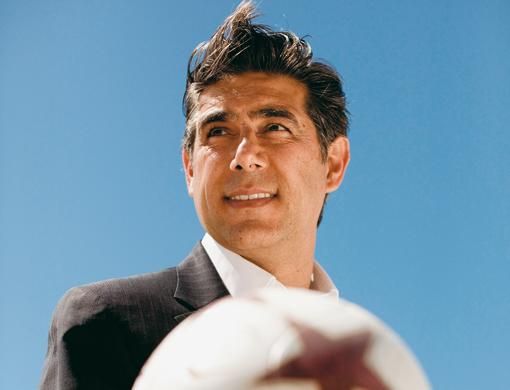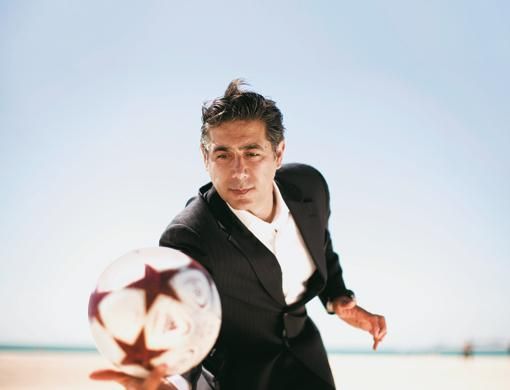Afshin Ghotbi is unlikely to forget the moment he was confirmed as manager of Iran's national football team. Slotted into the front seat of our cameraman's pick-up, we were circling the Jumeirah Beach Residence carpark, trying to figure out where to have him photographed, while he nattered away on the phone in Farsi, one hand to his ear, the other gripping the grab handle.
The conditions for negotiation may have been far from ideal, not least due to the photographer's erratic driving, but also due to the fact we were chatting away amongst ourselves, blissfully unaware of the enormity of Afshin's telephone call.
Only when we stopped, marked out some lines in the sand and did a few test-shots did Afshin emerge from the car and proclaim, "I think we've reached a deal." That's when we realised why his conversation had been so intense.
As the first to congratulate Afshin on his new job, I admit to having been less than convincing in my praise. In fact, I think I screamed and kicked some sand in his direction.
My story, the one we were shooting pictures for that afternoon, the one that I had already penned, was about an American-Iranian coach who had been confirmed as manager to the Iranian national team three times, only to have the decision overturned at the last minute by some mysterious events.
The piece questioned whether Iran would ever allow someone with US citizenship to take the country's top football job, given the current political climate. Like Brian Clough and the England job, Afshin was the most qualified to lead his country but had been continually overlooked, or appointed and then let down before signing the contract.
Standing on the beach helpless, knowing that his appointment meant a late night of rewriting for me, I asked Afshin if it was certain this time. He nodded. I kicked some more sand.
Happy for him really
As we sat in coffee shops in and around his Dubai home in the week leading up to the photo shoot, he struck a humble pose, devoid of all airs and graces, but with a Persian Al Pacino-like look that made it impossible for passers-by not to do a double-take. Well-read and courteous to a fault, it's obvious, in his demeanour, that he hasn't been tainted by the ill-effects of modern football.
During our meetings he had been paranoid about being used as a pawn in some wider game, was disappointed about coverage of him on the seemingly agenda-driven BBC website and quick to point out that he left Iran at 13 – before the revolution – because his father remarried, not because they were related to the Shah as is circulated in the press.
"My father was a teacher in Tehran, we all slept on the floor of his flat. I went to live in California with him after my stepmother, a dentist, decided to relocate. I lost most of my street soccer friends to the Iraq-Iran war and if I had stayed, who knows, I may not be here."
Reunited with his estranged mother, he returned to Tehran 30 years later to take the hot seat at Iranian Pro League outfit, Persepolis. In his first job as a head coach he ended up winning the 2007/08 Championship by one point on the last day of the season in front of 110,000 fans, thanks to Sepehr Heidari's last-gasp goal.
Everyone, both young and old, took to the streets and celebrated in scenes reminiscent of the time Iran beat USA 2-1 at World Cup '98, a match that Afshin incidentally watched live from the USA's team bench as technical advisor to his adoptive homeland.
Lost boy found
His path into football management had been like Jose Mourinho a translator not thanks to a successful playing career, as is usually the case. When Afshin arrived in the US, he fell into a lost generation, stuck in a void between the collapse of the North America Soccer League in 1985 and the formation of Major League Soccer in 1993. Realising he couldn't make a living playing the beautiful game, he set up his own youth professional soccer academy.
From here, he groomed talent like John O'Brien and took him to Ajax Amsterdam, where he played for eight years. It was the first time an American player made it to a top European club and the first time an Iranian orchestrated such a feat.
Having met many top Dutch coaches along the way, Afshin's networks within international football spread and, with a degree in electrical engineering, he ended up making further headway with a coaching computer programme borrowed from Norway coach Egil Olsen.
"I got it four months or so before World Cup '98 and had to make it work for my old university coach Steve Sampson of team USA. It was a nightmare because it had no manual and was all in Norwegian."
While MasterCoach had been a statistical and mathematical piece of match analysis software, Afshin had the idea of using aerial cameras to underline more tactical and organisational faults in a team's formation.
His grasp of technology impressed the software company, who went on to hire him as a consultant. It also gained him the interest of Guus Hiddink, who invited Afshin to become South Korea's technical advisor for the 2002 World Cup, where the Koreans finished fourth.
This opened doors at club level with Suwon Bluewings, where Afshin took his first job as assistant manager, winning the Asian Champions League. He would move back to California to win the double with LA Galaxy, before attending his third consecutive World Cup final, this time with Dick Advocaat's South Korea in 2006.
His homecoming
Afshin had been denied a visa to Iran during the away leg of an Asian Cup Qualifier with South Korea and his team had also been responsible for knocking the Iranians out of the subsequent finals of that competition, 4-2 in a quarter final penalty shootout.
With instances like this recurrent throughout his career, it was always likely that Afshin would, for once, find himself on the Iranian side of one of these encounters. An opportunity presented itself when he was offered the job to manage Persepolis and he jumped at the chance to "complete himself both professionally and spiritually".
Going home would connect the man with the other side of his making, but it would be no easy feat. "It was an amateur non-league infrastructure with Manchester United-like expectations at Persepolis."
On top of this, there were certain influences hellbent on undermining his success from inside the club and out. Just like the time Arsene Wenger and Jose Mourinho joined the English league with new ideas and a fresh approach, Afshin, flashy and always suited, with a Californian twang, was instantly disliked by those who had been at the club for years, especially as he promised fans he'd win the championship from day one.
His nickname 'The Red Emperor' may have unsettled some, but as political groups swarmed for control over the state-owned club, it was only really Afshin who had the supporters' complete adoration. "The secret to my success was that I was one of the people. I touched the hearts of 70 million football fans." He became the managerial benchmark for his professionalism: always smart, gracious in defeat and complimentary about the opposition. An Iranian league record for 18 matches undefeated didn't hurt his iconic status either.
But despite all this popularity, Afshin experienced some hostility. A BBC article recalls the moment a group of about 50 supporters surrounded his car, carrying sticks and stones in an attempt to intimidate him out of the club. But he brushes this off as water under the bridge.
Soft goals, weird refereeing decisions and a six-point deduction mid-way through the season for unpaid salaries three years ago would also hinder his team's progress. Sources say team buses turned up hours late and fixtures were switched to weekdays so fans couldn't attend. Yet still they came.
Iranian President Mahmoud Ahmadinejad, whom Afshin describes as a soft and gentle man, would look him in the eye and say, "I'm proud of you. I believe you can make Persepolis champion." And with that, he did, against all odds.
"My story is that anyone can do it. It doesn't matter about your passport; maybe you have to work harder. Maybe you have to achieve more to be recognised for it. But with intelligence, hard work and perseverance you can achieve anything."
Third time lucky
Another season at Persepolis would involve splitting the team and starting again, a task that he opted against, given that it would bring him even more enemies. He left, despite mass protest to keep him at the club, and took some time off in Dubai while pursuing possible managerial jobs in Europe.
It was during this time that he received a third approach by the Iranian Football Federation to take control of the national team and lead them to the 2010 World Cup. If successful, it would be Afshin's and Iran's fourth outing to the finals, but their first together. Public opinion polls had been unanimous about bringing Afshin back.
Previously, Ali Daei and Mohammad Mayeli Kohan had been chosen ahead of him at the last minute. But then, the latter quit after just two weeks and suddenly Afshin, driving in circles around a car park near the beach in JBR, got a phone call. And with Iran currently in fourth place in their qualifying group, needing at least six points over their next three opponents (ironically the UAE, North and South Korea), it seems Afshin may be the best man for the job after all – much to the annoyance of some.













